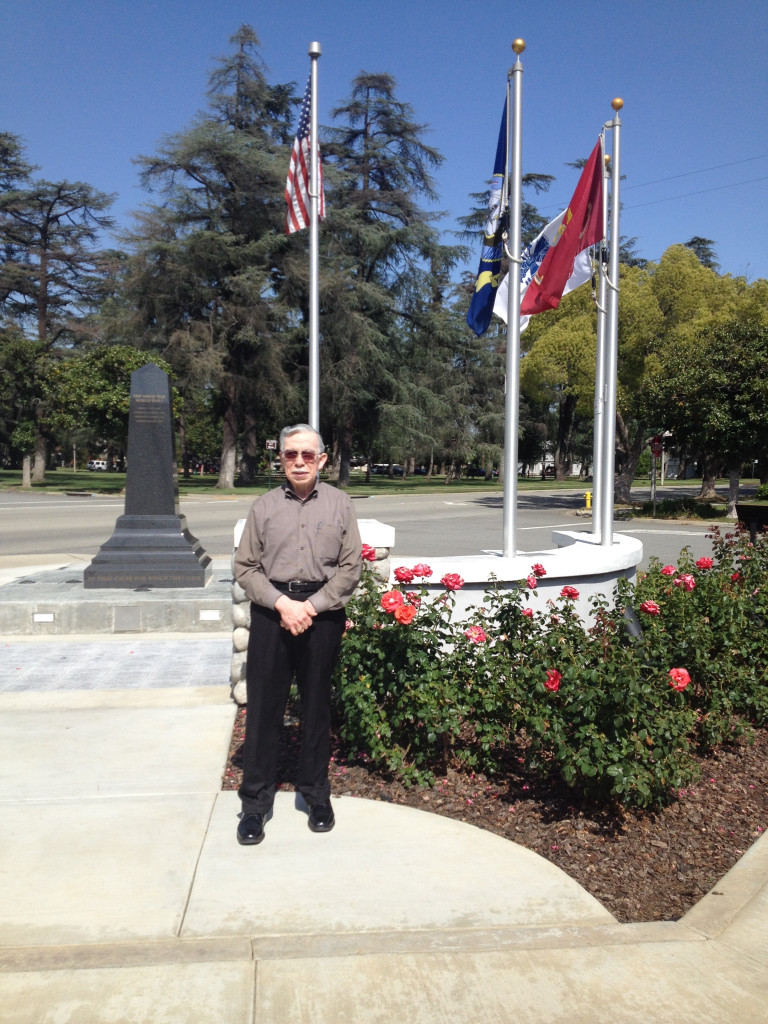Joseph R. Martinez, oral interview with Mariana Olga Cisneros, San Dimas, California, April 10, 2015. Digital Recording
Joseph R. Martinez spent his childhood in a predominantly white neighborhood in Azusa, California. His parents’ families, Esther and Joseph Martinez, both migrated to the United States from Mexico. Mr. Martinez entered college, but left in 1962 to enlist in the Marines. His mother was worried about his safety, but by this point Mr. Martinez felt it was his decision to make. After serving in Okinawa, Mr. Martinez served a tour in Vietnam in Marine Observation Squadron 6. He “felt that we were there to help the people. Because we knew and we heard and we saw the atrocities that were being committed by the North Vietnamese against the South Vietnamese.” Mr. Martinez spent some of his free time in Vietnam playing with children in a French orphanage near by. While visiting, he would notice:
As you went there you would see bullet holes in this building that were done by the Viet Cong shooting at this place, and there were babies in this place. And you wonder, How do people do this kind of stuff? How do they live with themselves doing that kind of stuff?
Instances such as this reaffirmed Mr. Martinez’ conviction in the United States involvement in the Vietnam War, however these convictions were not particularly political. He explained that his dedication came from a place of loyalty.
Mr. Martinez never felt subjected to prejudice in the Marines, save one instance in which a man from New York repeatedly called him names. However, he did see racism against African American soldiers occur, “It was normally brought on by the attitude of the Black individuals feeling that they had to…push themselves or take advantage of different things. It was just an attitude type thing.” Mr. Martinez stressed that he did not experience this regularly, but on the few occasions that he witnessed it, he felt it stemmed from immaturity, “People who do those types of things are insecure. They are insecure about their own– about who they are and what they are about to be.” He observed, “there’s always going to be prejudice from one race to another, whether its whites to blacks or blacks to whites or Hispanics or whatever. It wasn’t predominate, it wasn’t overt, it was–if it was there at all.” In particular, he felt that racism was not as prevalent in the Marine Corps, because, “In the Marine Corps we have a thing where there’s no black or white or brown: it’s only green. We all wear the same uniform.”
After Mr. Martinez returned to the United States from Vietnam, he immediately was able to find a job through connections with family friends. Later on in his life, he worked as an insurance salesman. He kept in contact with a few of his close friends from his days in the Marines, including a Sergeant he called Brownie. On one of his visits to Brownie on the base, Brownie convinced Mr. Martinez to rejoin the Marines in the reserves. Mr. Martinez felt some backlash from his community when he joined, since many individuals were against the Vietnam war.
And there were people that felt I should not continue to be in the reserves because of that anti military. And I got from different people comments about that…I let it slide off my back. I knew who I was, I didn’t need to tell them. I knew who I was and what I was about and my particular beliefs.
Although he did not agree with those opinions, he still respected them.
Mr. Martinez remained in the reserves until 1999, rising in the ranks until he became Chief Warrant Officer-4. Even years after his time in active duty, Mr. Martinez still felt a strong sense of duty to the Marine Corps:
Not only are you responsible for the things [in] that department and the mission of that particular department, you’re also responsible for the lives of your people. And we take that very seriously, because those people will make or break you.
Reflecting on the war, Mr. Martinez felt that the United States did not put itself in that ideal position to win the war, “I felt that we had not been given the proper opportunity to conduct the war. And to win it. That we had been made to fight the war with one hand behind our backs.” This sentiment did not impact Mr. Martinez’ pride for the United States, however, claiming that “Whether your people came from Poland, or England, or China, or from Argentina, if you live here, and you pledge allegiance to the red, white, and blue, you’re an American.”

